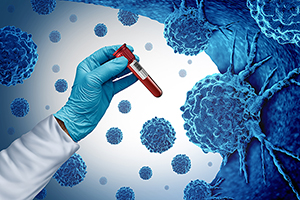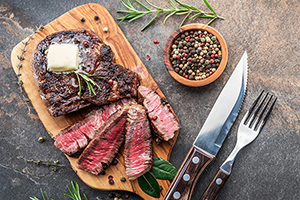| Podcast | |
|---|
 |
Cells Becoming “Rogue” as We Age and What to Do About It, Part 1
October 19, 2023
DNA methylation is an important part of the maintenance of normal DNA structure. As we age, a gradual DNA hypomethylation occurs at the genome-wide level. This phenomenon leads to genome instability, or modifications in the expression of certain genes (also known as epigenetic changes). Anomalies in cell division may be triggered, resulting in the formation of “rogue” cells, or cells not performing the functions they were genetically programmed to do. In this episode Neil Levin from Protocol for Life Balance discusses homocysteine, MTHFR genetic variants, and the impact of methyl donor supplements on overall health. Click HERE for part 2.
|
Share:
 |
|
 |
Cells Becoming “Rogue” as We Age and What to Do About It, Part 2
Dr. Hoffman continues his conversation with Neil Levin from Protocol for Life Balance about homocysteine, MTHFR genetic variants, and the impact of methyl donor supplements on overall health. Click HERE for part 1.
|
Share:
 |
|
 |
ENCORE: DNA testing: Is it ready for Prime-Time? Part 1
September 27, 2023
Dr. Sharon Hausman-Cohen, Chief Medical Director of IntellxxDNA, shares her perspective on the genetic testing revolution. What’s the difference between a mutation and a SNP (single nucleotide polymorphism)? How does the IntellxxDNA test differ from, say, 23andMe? Isn’t it potentially scary to find out you have a “bad” gene, like the ApoE4 gene that’s associated with Alzheimer’s Disease risk? Can genetic risk factors be overcome with diet, exercise, and targeted supplements? IntellxxDNA pinpoints obesity genes, genes that predispose to diabetes and heart disease, macular degeneration, autoimmune disorders, thyroid problems and osteoporosis. Certain SNPs predict the likelihood of neurodegenerative diseases when exposed to environmental toxins like mercury and glyphosate. Others may dictate higher requirements for antioxidants, B vitamins, magnesium, vitamin D, and choline. Why is the IntellxxDNA test only available through health practitioners? Some critics say genetic testing is only in its infancy and not yet ready for primetime—is this mistaken? What can genomic testing tell us about remedial strategies for autism? Click HERE for part 2.
|
Share:
 |
|
 |
ENCORE: DNA testing: Is it ready for Prime-Time? Part 2
Dr. Hoffman continues his conversation with Dr. Sharon Hausman-Cohen, Chief Medical Director of IntellxxDNA, who shares her perspective on the genetic testing revolution. Click HERE for part 1.
|
Share:
 |
|
 |
ENCORE: The Twists and Turns of Humans’ Evolutionary Path, Part 1
May 18, 2023
Alex Bezzerides Ph.D. is a professor of biology and author of "Evolution Gone Wrong: The Curious Reasons Why Our Bodies Work (Or Don't)." He contends our bodies are imperfect, the result of evolutionary compromises between conflicting imperatives. For example, big brains enabled humans to develop technology and language; but our big heads have doomed women to painful and perilous deliveries. Developing an upright posture enabled us to free our remarkable hands; but standing also cursed us with back, knee, and ankle problems. Bezzerides applies this paradigm to other health problems we’re prey to: crooked teeth, failing eyesight, choking deaths, and hernias. Are humans still evolving when we have medical technology to prevent nature from “culling the herd”? Are obesity and blood sugar problems holdovers of traits that once furthered our survival? Dr. Bezzerides is the biology professor I wish I’d had! Click HERE for part 2.
|
Share:
 |
|
 |
ENCORE: The Twists and Turns of Humans’ Evolutionary Path, Part 2
Dr. Hoffman continues his conversation with Alex Bezzerides Ph.D., a professor of biology and author of "Evolution Gone Wrong: The Curious Reasons Why Our Bodies Work (Or Don't)." Click HERE for part 1.
|
Share:
 |
|
 |
ENCORE: Sports Nutrition: Nutrients for Performance and Endurance, Part 1
December 8, 2022
Today we explore Nutrigenomics and sports nutrition with Brent Luycks (pronounced “Lucks”) a former Belgian champion cyclist who is founder of 4Gold, a company focused on enhancement of athletic performance. 4Gold works with professional athletes and ordinary optimizers to develop personalized nutrition programs geared to their genetic characteristics. Brent describes what insights can be gained from nutrigenomic profiling using saliva samples of DNA. In my case, for example, it bettered my understanding of my athletic aptitude (mixed), my injury potential, my recovery ability, and my unique requirements for nutrients associated with performance and endurance. Brent, as a survivor of Crohn’s disease, describes an innovative prebiotic, 2’-Fucosyllactose, a constituent of human milk. It has the potential to address GI disorders, and supports optimal absorption, a limiting factor in athletic performance. He also details ingredients in a sports supplement embraced by many top endurance athletes on the European circuit. Click HERE for part 2.
|
Share:
 |
|
 |
ENCORE: Sports Nutrition: Nutrients for Performance and Endurance, Part 2
Dr. Hoffman continues his conversation with Brent Luycks, a former Belgian champion cyclist who is the founder of 4Gold, a company focused on the enhancement of athletic performance. Click HERE for part 1.
|
Share:
 |
|
 |
ENCORE: Intelligent Medicine Radio Show for September 4, Part 1
September 6, 2021
Low-fat, Low-carb—when it comes to heart disease prevention, it doesn’t matter (REALLY??) What genetics tell us about same-sex attraction—“Born this way”? Teenage boy goes blind after subsisting on Pringle’s, white bread and French fries; Are two drugs the answer for this caller’s osteoporosis? Lifestyle, not genetics, explains most heart risk; Warning issued over vaping hazards in wake of 5 death, hundreds of reports of serious lung disease; Are nitrites and nitrates in foods hazardous—or beneficial? If bacon is bad for you, what about nitrate-rich vegetables? How mouthwash can blunt exercise circulatory benefits. Click HERE for part 2. Click HERE for articles and resources relating to this podcast episode.
|
Share:
 |
|
 |
Q&A with Leyla, Part 2: Is it possible to catch Covid from someone who is newly vaccinated?
December 9, 2020
In your opinion, is organic virgin olive oil better than non-organic olive oil?; My husband has diabetes and high blood pressure despite eating correctly and exercising. What else can he do--is it his genes?; Is it possible to catch covid from someone who is newly vaccinated?; Study reveals connection between gut bacteria and vitamin D levels. Click HERE for part 1.
|
Share:
 |
|
|





























